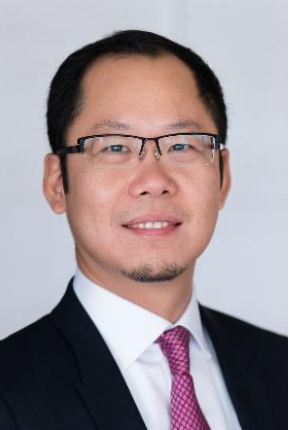Post-Covid megatrends such as digital transformation and sustainability have made it necessary for organisations to attract talented individuals with core competencies that enable new ways of achieving success. However, talent scarcity requires talent management strategies that go beyond sky-high salaries and generous rewards.
At PeopleSearch’s recent event, ‘Winning the Post-Covid Talent War’, Eric Lim, Chief Sustainability Officer and Head of Group Finance at United Overseas Bank, touched on strategies that have come to be seen as business imperatives since Covid-19.

Talent scarcity requires talent management strategies that go beyond sky-high salaries and generous rewards.
It’s indisputable that Covid-19 has dramatically transformed the way humans live and work. This, in turn, has triggered a sea change in business operations across sectors, lending impetus to several notable megatrends.
Among them are digital transformation and sustainability, according to Eric Lim, Chief Sustainability Officer and Head of Group Finance at United Overseas Bank (UOB), a multinational bank headquartered in Singapore.
“These are trends that businesses must recognise and embrace. They influence operations and consequently, talent strategies as well,” says Eric.

Eric Lim, Chief Sustainability Officer and Head of Group Finance at United Overseas Bank
For one, the workforce and consumers were made to go digital.
“I see it as a structural change. Covid-19 essentially didn’t give anyone – senior management, workers, or customers – a choice.”
With organisations forging ahead to transform digitally to serve internal and external stakeholders, the war for tech talent has intensified. The days when companies could poach someone from a competing organisation with a pay raise of just 10 per cent are over.
“Now, technology talent swagger in, knowing that if they don’t pass your talent assessment, they’ve got three or four other organisations tripping over themselves to offer them up to 40 per cent more,” says Eric.
In the area of sustainability, while the Covid-19 crisis has dominated headlines and taken attention away from the threat of climate change, many governments and corporations are now realising that too swift a return to business as usual will be irrevocably harmful to the environment.
McKinsey research points to the aftermath of the 2007–08 financial crisis. It states that while the economic slowdown sharply reduced global greenhouse-gas emissions in 2009, “by 2010, emissions had reached a record high, in part because governments implemented measures to stimulate economies, with limited regard for the environmental consequences.” The goal for many organisations today is to find a high-growth recovery formula that is also low-carbon.
Policy makers in many parts of the world are also working to develop sustainable blueprints for economic growth that involve the creation of green jobs. Even before the pandemic, the United Nations’ International Labour Organisation projected that if Asia moved towards efforts to slow global warming, 14.2 million green jobs could be created by 2030.
For one, Singapore expects to create 55,000 green jobs over the next decade.
The greater focus on Environmental, Social and Governance (ESG) considerations is already influencing product offerings, business processes and partnerships. This focus is expected to influence job functions in areas such as risk management, regulation and control, procurement and operations.
However, given that such considerations are emerging only now, the talent pool in this arena is small.
“Sustainability in Asia is only at the beginning of its journey. Quality sustainability talent in the country is very thin. ESG is not an area for which we’ve trained people in schools. Up till now, Singapore and Singapore-based corporates have not spent much time on building talent pools for these job functions,” says Eric.
As a result, a lot of ESG talent in Singapore is imported.
While more locals work on cultivating skills and know-how, companies are finding themselves fiercely competing for ready talent.
RISING ABOVE TALENT SCARCITY
In order to attract and retain forward-thinking talent to take on these megatrends, organisations have to be forward-thinking too. This must be reflected in talent management policies.
For one, remote and flexible work arrangements must be a priority.
“Organisations are not likely to return to fully working at the office. If you’re going to be very rigid about it and everyone’s going to have to come to the office to face the boss, you’re going to get shut off from talent,” says Eric.
“One of the big things that we’re working on right now is how to achieve a constructive, healthy hybrid functionality, where employees can come in 60 per cent of the time and have the flexibility to work from home 40 per cent of the time, but more importantly go beyond that 60-40 headline number to still create strong cultures of networking and the ability to work in teams to solve complex problems,” he adds.
Talent development is also a vital consideration.
“We’ve gotten a bit more creative with how we retain and re-train talent,” says Eric.
UOB’s holistic learning and development programme, known as ‘Better U’, is designed to support employees in their development journey and ultimately, help them build successful and meaningful careers in the digital age.
Given that job roles will continue to be redefined by emerging and new technologies, the Better U programme aims to help employees broaden their soft skills as well as digital and data skills.
“Such efforts not only equip them with the skills to stay relevant to the organisation, but also give them a sense that the organisation cares about their development. This increases retention,” says Eric.
LEVERAGING SKILLS ADJACENCIES
Bearing in mind that technology and ESG talent is not readily available today, there is also a greater effort to identify skills adjacencies and to leverage them to help employees develop new and necessary skills.
In other words, leaders must be able to identify linkages between employees’ existing abilities and skills that are needed for the organisation’s emerging needs. This will make it easier to design and provide appropriate upskilling and reskilling opportunities.
Eric himself has had to undergo reskilling and upskilling in the area of ESG. He recognised it as a strategic driver and business imperative for any organisation. In that respect, ESG dovetails with finance.
“I’ve always been a finance guy. But at the beginning of this year, I agreed to take on the sustainability role in addition to the finance role. I did this because at the end of the day, both functions require the ability to read and respond to megatrends that are crucial to any organisation’s growth.”
His upskilling also involved a lot of self-directed learning.
“I have a 15-year-old daughter. She’s a wonderful kid and every Saturday after lunch, she’ll sit at the dining room table and do her homework. I started to accompany her. She’d be doing school work and I’d sit right next to her with piles of ESG material.”
Those in the C-suite need to also pay special attention to developing strategic and critical thinking skills and sharpening their business acumen.
“At the end of the day, we are all business leaders. For example, a CTO is a business leader whose mandate is technology, a CFO is a business leader whose mandate is finance. Everybody is a business leader. It’s just that each of us take care of different functions. All these functions have to come together to take the business to the next level, so transferable skills such as strategic thinking, etc. are very important.”
“We must also acknowledge that the world is so complex now that no single brain can process it all. The ability to collaborate well has also become critical,” he adds.
RETURN TO FUNDAMENTALS
As much as the world is changing rapidly, experts have pointed out that the basics tend to stay the same.
“So what are the basics? People join organisations, but they leave bosses. Nine out of 10 times, they’re leaving the boss or an environment that they didn’t like,” says Eric.
Therefore, organisations must return to fundamentals in terms of cultivating robust leadership at all levels.
“In this war for talent, it is all the more important that we continue to focus on more than just building our brand so that we can attract talent. We must also work on our culture and leadership which includes senior management, middle management and our team leads. They affect the daily lives of employees across the board. We have to help them upskill in terms of leadership and managing talent in keeping with the times, because they are the ones who will help us keep our talent.”




Leave A Reply